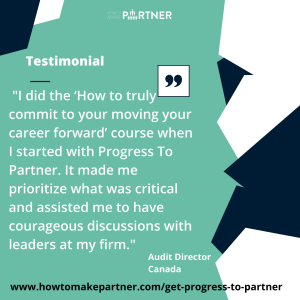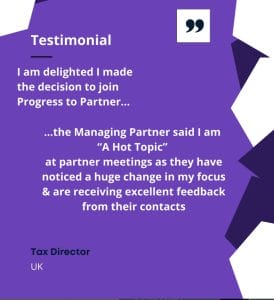If you were asked, “What will progress your career?” I’m pretty sure that your answer would be something akin to “goal-setting plus a lot of hard work.” This would be no surprise as isn’t that the winning combination for all the personal and professional goals that we set ourselves? Let me ask you something, how has that worked out for you in the past? Have you achieved everything you set?
Most of us have personal and professional goals because traditional leadership theories spout the power of doing so. What many of us struggle with though, is knowing how to act on them once they’re set. Many of us get caught up in the idea of reaching our goals without actually considering the baby steps (or habits) that we need to take to progress and get there. This is why we often don’t get there at all. To explore this further, this article explains why goals often don’t work and what actually does if you want to progress your career.
Why goals often don’t work…
 That “high goals and hard graft” mantra that you would have heard somewhere along the partnership track is not completely correct. Despite what traditional leadership theories say, setting goals is not the key to success. At least, setting goals on its own isn’t. While goals are great for short term accountability, they don’t deliver sustained, long-performance improvements. What we mean by this is that goals are great for getting you to hit targets in the immediate, but when you’re not taking the proper actions to attain them, you won’t achieve success consistently. How many of you have run a marathon and then never run much after that? How many of you have lost weight only to put it back on again? Many of us have experienced this lapse in progress when we set ourselves goals and it’s because of one or more of these six truths:
That “high goals and hard graft” mantra that you would have heard somewhere along the partnership track is not completely correct. Despite what traditional leadership theories say, setting goals is not the key to success. At least, setting goals on its own isn’t. While goals are great for short term accountability, they don’t deliver sustained, long-performance improvements. What we mean by this is that goals are great for getting you to hit targets in the immediate, but when you’re not taking the proper actions to attain them, you won’t achieve success consistently. How many of you have run a marathon and then never run much after that? How many of you have lost weight only to put it back on again? Many of us have experienced this lapse in progress when we set ourselves goals and it’s because of one or more of these six truths:
- Goals are temporary – while goals are great for that initial push at the beginning of the year, people tend to revert back to their old ways, especially when they feel depleted.
- Goals can negatively affect motivation – if you don’t reach your goals within your timeframe, it can make you feel insufficient. Self-doubt can have a big impact on motivation and therefore productivity.
- Goals demand discipline – everyone can summon a strong sense of self-discipline to begin with, but this is hard to keep up. Burning yourself out can then result in stagnation and not progressing at all.
- Goals limit you – focusing on a target can sometimes limit your capacity and progress. Many people don’t consider actually surpassing that goal as the aim is to hit that target.
- Goals can sometimes be unrealistic – many people set unrealistic goals and this affects their motivation and performance.
- Goals can be overwhelming – although your seniors may recommend setting yourself one big goal and then breaking this down into milestones (e.g. your 10-year goal, 5-year goal, 1-year goal, monthly and weekly goals), this can soon become confusing and overwhelming.
As you can see, setting goals isn’t enough. If you’re going to make partner, if you’re going to progress your career, it isn’t about one big push but rather improving your sustained performance. If you think about two sports teams when they enter the field of play, both have the goals to win. Both teams have prepared exactly as they need to, but only one team can win. This shows that having a goal doesn’t mean that you’re going to achieve it, that’s not what makes a difference. (Find out How to set career goals that you actually achieve).
Take a step forwards to working on your own career development and sign up to my weekly newsletter here and you’ll find out what you need to be working on in your career development (and how to make the time for your career development) to progress your career in your firm.
Need help to progress your career? Don’t forget to download my Career Action Plan, with full instructions, to make sure you prioritise what needs to get done.

Note to my Progress to Partner Academy members: You can find out more about effective goal setting in the Mindset part of Progress to Partner. In particular the on demand course “How to truly commit to moving your career forward” course
Making partner is a marathon, not a sprint
 Just like the long-term success of a sports team, when it comes to your career, it’s a marathon and not a sprint. What we mean by this is that just like that sports team that lost their game, which was their immediate goal, they know that to achieve their one big goal (i.e. to be the best team in the league) they need to work on sustaining their performance. This means working on their fitness, eating healthy, and continuing to develop their athletic skills over time. When thinking about how to progress your career, this is the mindset that you need. Your business case and network won’t get built overnight; to make partner, you will need to rack up the miles over time and sustain this performance to reach your goal. So if setting goals isn’t enough, how do you finish that marathon? More than that, how do you make the time to focus on your Career? To get to the finish line and experience true success without burning yourself out, you need to work on sustaining your performance and that boils down to two things:
Just like the long-term success of a sports team, when it comes to your career, it’s a marathon and not a sprint. What we mean by this is that just like that sports team that lost their game, which was their immediate goal, they know that to achieve their one big goal (i.e. to be the best team in the league) they need to work on sustaining their performance. This means working on their fitness, eating healthy, and continuing to develop their athletic skills over time. When thinking about how to progress your career, this is the mindset that you need. Your business case and network won’t get built overnight; to make partner, you will need to rack up the miles over time and sustain this performance to reach your goal. So if setting goals isn’t enough, how do you finish that marathon? More than that, how do you make the time to focus on your Career? To get to the finish line and experience true success without burning yourself out, you need to work on sustaining your performance and that boils down to two things:
- Your mindset, and;
- Your habits.
In James Clear’s book, Atomic Habits, he talks about how you rise to the level of your goals and you fall to the level of your personal systems, i.e. your mind and your habits. This couldn’t be more relevant here as it is the long term habits that you’re going to do day-in and day-out, and week-in and week-out that will sustain you so that you actually progress your career. Read: The 4 foundational habits you need to master to always achieve your goals
Take a step forwards to working on your own career development and sign up to my weekly newsletter here and you’ll find out what you need to be working on in your career development (and how to make the time for your career development) to progress your career in your firm.
How to progress your career
Real quickly, we are going to outline how to actually reach the goals that you set yourself to help you progress your career.
1. Shift your mindset
 You have to have the right mindset to sustain your performance so that you can achieve your goals. The good news is, is that shifting your mindset to a successful one is the easiest step. To shift your mindset, you need to first consider exactly what you want to do and how you want to do it. Not only will this help you come up with your business development strategy and the time you’re going to spend on it, but having this ‘why’ will help keep you focused on your long-term direction. Not to mention, it will motivate to keep going when times get tough. The second thing you have to do with your mindset is to treat your career like it’s your best client. It sounds strange, but thinking of your business this way means that you will put actual time towards it. If you have a great client, you will make an account management plan, so if you treat yourself as a client, you should create a career plan for you too. Schedule in an hour or more every Friday morning for yourself. You’ll soon find that you can make time to focus on your career and the stuff that you’re doing is moving you forward. Read: Why winning business successfully is all about the right mindset not skill level
You have to have the right mindset to sustain your performance so that you can achieve your goals. The good news is, is that shifting your mindset to a successful one is the easiest step. To shift your mindset, you need to first consider exactly what you want to do and how you want to do it. Not only will this help you come up with your business development strategy and the time you’re going to spend on it, but having this ‘why’ will help keep you focused on your long-term direction. Not to mention, it will motivate to keep going when times get tough. The second thing you have to do with your mindset is to treat your career like it’s your best client. It sounds strange, but thinking of your business this way means that you will put actual time towards it. If you have a great client, you will make an account management plan, so if you treat yourself as a client, you should create a career plan for you too. Schedule in an hour or more every Friday morning for yourself. You’ll soon find that you can make time to focus on your career and the stuff that you’re doing is moving you forward. Read: Why winning business successfully is all about the right mindset not skill level
2. Develop daily habits
 Now you have the right mindset, you need to take action and actually do the high-value tasks that are going to progress your career. This is where most people fall down and it’s because they don’t do these tasks consistently enough to make them become habits. Consistency is important because once these tasks become habits, you do them without having to actively think about them. They become automatic and embedded in your routine. They help you really deliver at the high level that you need to. To embed these habits, these positive personal systems that set you up for success, you need to follow these 3 steps:
Now you have the right mindset, you need to take action and actually do the high-value tasks that are going to progress your career. This is where most people fall down and it’s because they don’t do these tasks consistently enough to make them become habits. Consistency is important because once these tasks become habits, you do them without having to actively think about them. They become automatic and embedded in your routine. They help you really deliver at the high level that you need to. To embed these habits, these positive personal systems that set you up for success, you need to follow these 3 steps:
- Set your one big focus – what would make the biggest difference to your career if you focused on it for the next 90 days? Maybe it’s “I’m going to find 3 introducers within the next 6 months who will start sending me work.” Perhaps it’s “I’m going to increase my profile so that I get on the long list for Director at my Big 4 firm.” Or, maybe it is more personal such as “I’m going to feel more confident within myself” or “I’m going to focus on making sure I’m getting enough sleep and self-care.” All of this can help to progress your career.
- Split your focus into short term goals – to prevent confusion and becoming overwhelmed, take your one big focus and put three monthly goals on it. With each monthly goal, you can then outline your three sub-goals. Once a week, you can then look ahead and know what one thing you want to achieve that week and what you need to do on your career each day to move towards it.
- Do and review – by spending time planning what you need to do and putting it into your diary, you can then make it happen. Your daily goals shouldn’t be too daunting, such as ’10 minutes of LinkedIn every day’ or ‘make one phone call.’ It might not seem like much but when these build up, they ensure that you’ve hit your weekly target at the end of the week. If you do this at the same time every day or link it with another regular task, over time this will become a very positive habit, one that will move your career forward. Just remember to not be so hard on yourself. Review every week to see how you’ve done and adjust to find what works best for you.
Take a step forwards to working on your own career development and sign up to my weekly newsletter here and you’ll find out what you need to be working on in your career development (and how to make the time for your career development) to progress your career in your firm.
Read: Your checklist to expertise: 6 daily habits you must have to become a rainmaker
Start achieving (or exceeding) your goals to move forward

Do what actually works to progress your career. Treat your career as your biggest client, set yourself one big focus that you’ll focus on for the next 90 days and break it right down to daily tasks. These tasks will become habits, habits that will drive you forward so that you can start ticking off your goals and making new ones.
Need help to progress your career? download my Career Action Plan, with full instructions, to make sure you prioritise what needs to get done.
Take a step forwards to working on your own career development and sign up to my weekly newsletter here and you’ll find out what you need to be working on in your career development (and how to make the time for your career development) to progress your career in your firm.








